Cutting Sugar on a Keto Diet: The Sweet Life Without Carbs
Cutting sugar on a keto diet doesn’t mean giving up on sweetness! Whether you’re satisfying a sweet tooth or experimenting in the kitchen, there are plenty of low-carb sugar substitutes that let you indulge without guilt. From natural options like stevia to newcomers like allulose, keto-friendly sweeteners have revolutionized desserts and beverages. Did you know that erythritol, a popular choice among keto enthusiasts, has zero net carbs and only 6% of the calories of sugar? Let’s explore the best options to keep your diet sweet and carb-conscious!
What Makes a Sweetener Keto-Friendly?
Not all sweeteners are created equal, especially on keto. To be keto-friendly, a sweetener must have little to no impact on your blood sugar levels. This means opting for options with:
- Low glycemic index (GI)
- Zero or nearly zero net carbs
Keto sweeteners typically fall into two categories: natural sweeteners and artificial sweeteners. These alternatives help maintain ketosis, the metabolic state where your body burns fat for energy instead of carbs—a win-win for low-carb lifestyles!
Top Natural Keto Sweeteners
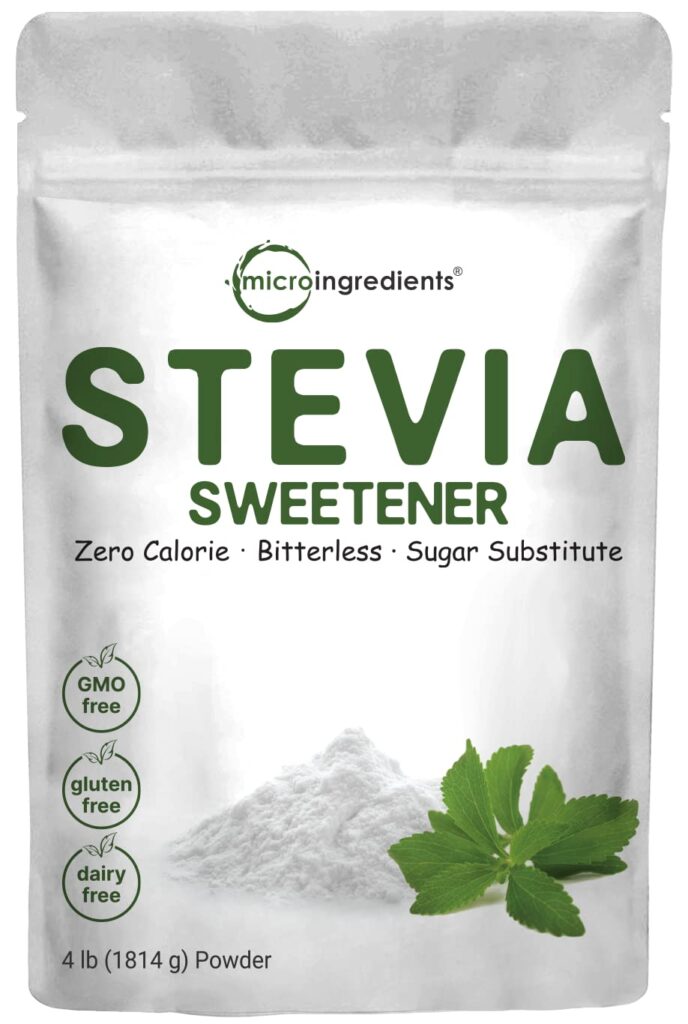
Derived from the leaves of the stevia plant, this sweetener is 200–300 times sweeter than sugar. With zero calories and zero carbs, it’s ideal for sweetening drinks or recipes. Some may notice a slight aftertaste, but many brands offer blends that minimize it.
Stevia is a popular plant-based sweetener derived from the leaves of the Stevia rebaudiana plant, native to South America. Known for its intense sweetness, it is up to 200–300 times sweeter than sugar, while being completely calorie-free. Stevia has become a favorite among those seeking a natural sugar alternative for keto, diabetic, and calorie-conscious diets.
What Makes Stevia Unique?
Stevia stands out due to its distinct properties:
- Natural Origin: Unlike artificial sweeteners, stevia is plant-derived and minimally processed.
- Zero Calories: Despite its intense sweetness, stevia adds no calories to your diet.
- Zero Glycemic Impact: It does not raise blood sugar or insulin levels, making it ideal for diabetics and those following low-carb lifestyles.
- Heat Stability: Stevia remains stable at high temperatures, making it versatile for cooking and baking.
- Concentrated Sweetness: Just a tiny amount of stevia is needed to achieve the same sweetness as sugar, thanks to its concentrated sweet compounds called steviol glycosides.
Benefits of Stevia
Stevia offers several health and practical benefits:
- Weight Management: Its zero-calorie nature supports weight loss or maintenance goals by reducing overall calorie intake.
- Blood Sugar Control: Stevia’s lack of impact on blood glucose levels makes it safe for diabetics.
- Heart Health: Some studies suggest that stevia may help lower blood pressure and cholesterol levels.
- Dental Health: Unlike sugar, stevia does not contribute to cavities or promote harmful bacteria growth in the mouth.
- Natural Sweetener: It provides a clean, plant-based alternative for those avoiding synthetic or artificial sweeteners.
Popular Uses of Stevia
Stevia’s versatility allows it to be used in a variety of culinary and everyday applications:
- Beverages: Sweeten coffee, tea, smoothies, and lemonades with a few drops or a small scoop of stevia.
- Baking: Use stevia in recipes for cookies, cakes, muffins, and more as a sugar substitute.
- Desserts: Perfect for no-sugar puddings, ice creams, and jams.
- Store-Bought Products: Often found in sugar-free drinks, yogurts, and snack foods.
- Condiments and Sauces: Stevia can add a touch of sweetness to salad dressings, marinades, or barbecue sauces.
Potential Drawbacks
While stevia is a fantastic sugar alternative, it does have a few potential downsides:
- Aftertaste: Some people find that stevia has a slightly bitter or licorice-like aftertaste, though blends with other sweeteners can minimize this.
- Concentrated Sweetness: Its intense sweetness can make it easy to overuse or misjudge the amount needed.
- Blending with Sugar: Some commercial stevia products are blended with sugar or fillers, which may affect its carb and calorie content. Always check the label.
- Not Always Suitable for Baking: Because stevia lacks the bulk of sugar, it may not work well in recipes that rely on sugar for texture or structure.
Why Choose Stevia?
Stevia is an excellent choice for those seeking a natural, zero-calorie sweetener that’s suitable for a wide range of diets. Its plant-based origin appeals to health-conscious consumers, while its glycemic neutrality makes it safe for diabetics. Whether you’re cutting carbs, managing weight, or simply avoiding sugar, stevia provides a guilt-free way to enjoy sweetness.
Pro Tips for Using Stevia
- Start Small: A little goes a long way! Begin with small amounts and adjust to taste.
- Combine for Better Flavor: Mix stevia with sugar alcohols like erythritol or natural sweeteners like monk fruit to reduce aftertaste and enhance sweetness.
- Choose High-Quality Products: Look for pure stevia or blends without added sugars or fillers.
- Experiment with Recipes: While great for beverages and some desserts, stevia may not work as a direct sugar replacement in all baked goods. Use recipes specifically designed for stevia.
- Storage: Keep stevia in a cool, dry place to maintain its potency and freshness.
Monk Fruit
Hailing from Southeast Asia, monk fruit is 150–200 times sweeter than sugar. It’s calorie-free, carb-free, and packed with antioxidants called mogrosides. Monk fruit is versatile, making it perfect for baking cookies, sweetening tea, or any dish needing a natural sugar alternative.
Best Sugar Alcohols for Keto
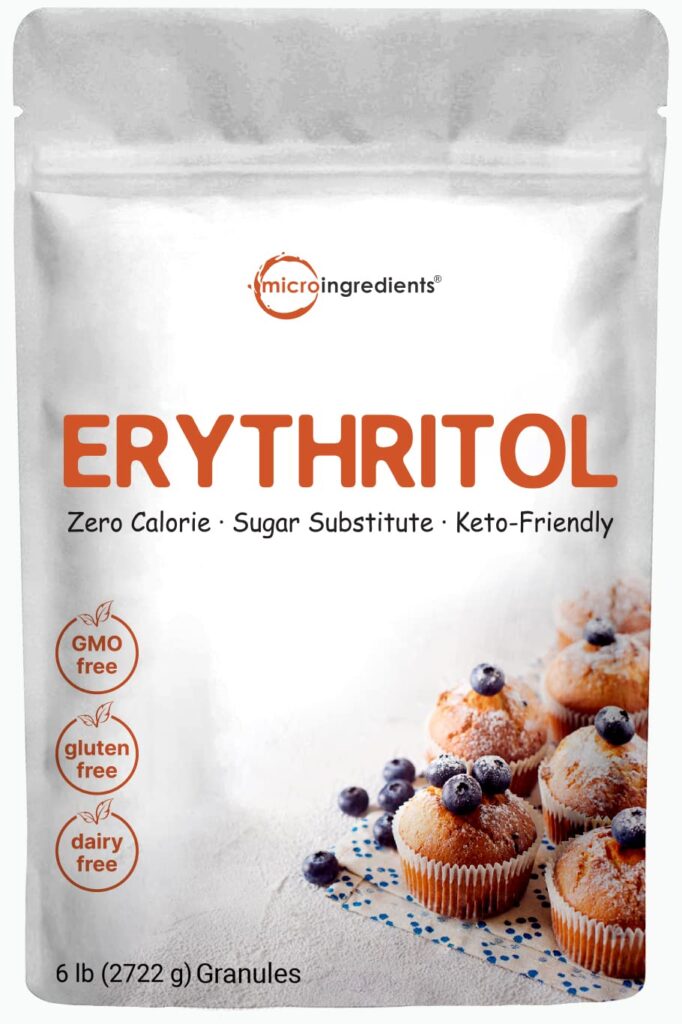
Erythritol is a sugar alcohol that has become a staple for those following keto and low-carb diets. Derived from natural sources like fruits and fermented foods, it offers a sweet, sugar-like taste without the guilt. Unlike regular sugar, erythritol contains almost no calories and has a glycemic index of zero, meaning it won’t spike your blood sugar or insulin levels—an essential feature for anyone on a ketogenic diet. Erythritol: A Cornerstone of Keto and Low-Carb Lifestyles
What Makes Erythritol Unique?
Erythritol stands out from other sweeteners for several reasons:
- Low Calorie Count: With only 0.2 calories per gram, it’s far lower than sugar’s 4 calories per gram.
- Zero Net Carbs: The body doesn’t metabolize erythritol like other carbohydrates, so it’s excreted unchanged, making it a true zero-carb sweetener.
- Mild Sweetness: Erythritol is about 70% as sweet as sugar, offering a gentle sweetness that complements a variety of recipes.
- Digestive Comfort: Unlike some sugar alcohols, erythritol is less likely to cause digestive upset when consumed in moderate amounts.
Benefits of Erythritol
Erythritol brings a range of benefits to the table:
- Blood Sugar Control: It has no impact on blood sugar or insulin, making it a safe option for diabetics and those on keto diets.
- Tooth-Friendly: Unlike sugar, erythritol doesn’t feed harmful bacteria in the mouth, helping to reduce the risk of cavities.
- Versatility in Recipes: Its crystalline structure mimics sugar, making it ideal for baking, beverages, and even candies.
Popular Uses of Erythritol
Erythritol is incredibly versatile and can be used in a wide range of culinary applications:
- Baking: Its sugar-like texture makes it perfect for cookies, cakes, and other baked goods.
- Beverages: Add it to coffee, tea, or homemade lemonade for a guilt-free sweetener.
- Homemade Treats: From sugar-free jams to keto ice cream, erythritol blends seamlessly into recipes.
- Store-Bought Products: It’s a common ingredient in sugar-free snacks, chocolates, and gum.
Potential Drawbacks
While erythritol has many advantages, there are a few considerations to keep in mind:
- Cooling Effect: Erythritol can leave a cooling sensation on the tongue, which some people find unusual or unpleasant.
- Digestive Sensitivity: Although it’s generally well-tolerated, consuming large amounts may cause bloating or mild discomfort in sensitive individuals.
- Blending for Sweetness: Since erythritol is less sweet than sugar, it’s often combined with other sweeteners like stevia or monk fruit to achieve the desired level of sweetness.
Why Choose Erythritol?
Erythritol is an excellent option for anyone seeking a natural, low-calorie, and carb-free sugar alternative. Whether you’re managing diabetes, aiming to lose weight, or sticking to a keto diet, erythritol allows you to enjoy sweetness without compromise.
Pro Tip: How to Use Erythritol Effectively
Dissolve for Smoothness: In recipes like sauces or beverages, ensure erythritol is fully dissolved for a smoother texture.
Measure Carefully: Since it’s less sweet than sugar, you may need to adjust quantities depending on the recipe.
Pair with Other Sweeteners: To offset the cooling effect and enhance sweetness, try blending erythritol with stevia, monk fruit, or allulose.
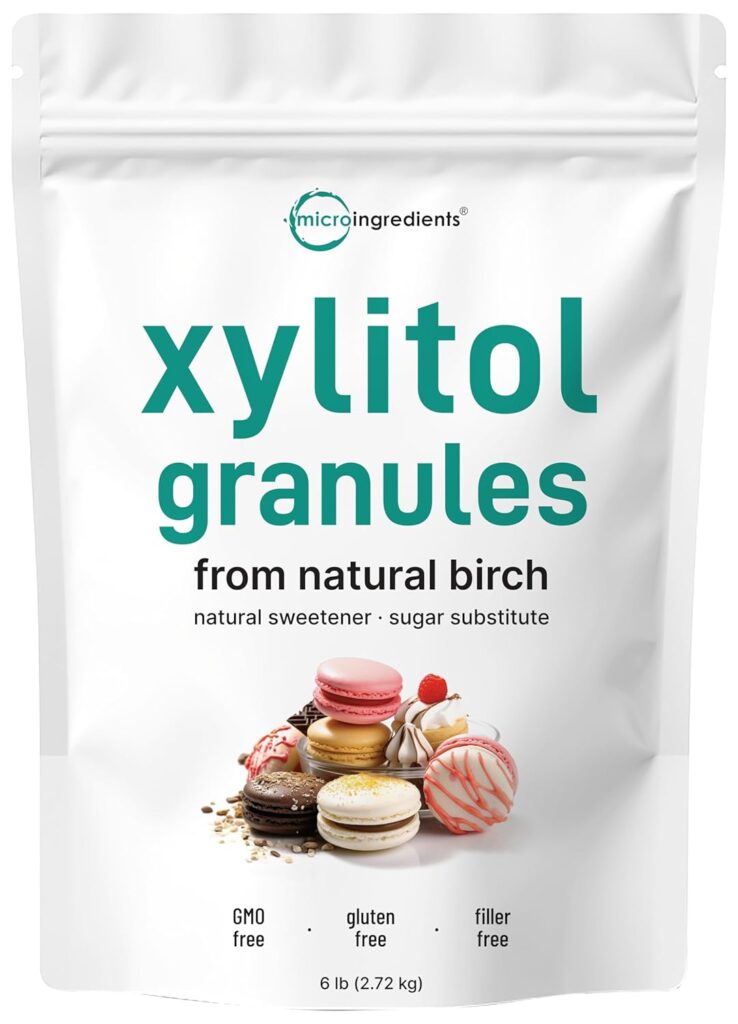
Though it contains slightly more carbs than erythritol, xylitol is a decent keto-friendly option. It’s commonly found in sugar-free gums and mints due to its similar sweetness to sugar. Caution: Xylitol can cause digestive upset and is toxic to dogs.
Xylitol is a natural sugar alcohol commonly used as a sugar substitute in a variety of foods and products. Found in small amounts in fruits, vegetables, and even the human body, it is often extracted from birch trees or corn for commercial use. Xylitol has a similar sweetness to sugar but with significantly fewer calories, making it a popular choice for those on low-carb or sugar-conscious diets.
What Makes Xylitol Unique?
Xylitol stands out from other sweeteners due to its distinctive properties:
- Natural Origins: Unlike some artificial sweeteners, xylitol is naturally occurring and derived from plant-based sources.
- Sugar-Like Sweetness: Xylitol has a sweetness nearly identical to sugar, making it a seamless replacement in most recipes.
- Low Glycemic Index: With a glycemic index of 7, it has minimal impact on blood sugar levels, making it suitable for diabetics and those on low-carb diets.
- Dental Benefits: Xylitol is particularly known for its ability to reduce the risk of cavities by inhibiting the growth of harmful bacteria in the mouth.
Benefits of Xylitol
Xylitol offers a variety of health and practical benefits:
- Blood Sugar Management: It doesn’t cause significant spikes in blood sugar or insulin, making it a safer choice for diabetics.
- Supports Oral Health: Regular use of xylitol has been shown to reduce tooth decay, prevent cavities, and even improve overall oral health.
- Low Calorie Count: Xylitol has about 40% fewer calories than sugar, making it a helpful tool for weight management.
- Natural Taste and Texture: Its sugar-like taste and texture make it an excellent substitute in many culinary applications.
Popular Uses of Xylitol
Xylitol is incredibly versatile and is used in a wide range of products and recipes:
- Sugar-Free Gum and Mints: Xylitol is a common ingredient in chewing gum and mints, providing sweetness while promoting oral health.
- Baking: Use xylitol in cookies, cakes, and muffins for a sugar-free twist.
- Beverages: Stir it into coffee, tea, or homemade lemonades for a guilt-free sweetener.
- Homemade Treats: Create sugar-free ice creams, syrups, or sauces with xylitol as a key ingredient.
- Pharmaceuticals: Xylitol is often added to medicines, particularly syrups and lozenges, to improve flavor without adding sugar.
Potential Drawbacks
While xylitol is generally safe and well-tolerated, there are a few potential drawbacks:
- Digestive Upset: Consuming large amounts of xylitol can cause digestive issues like bloating, gas, or diarrhea in some individuals. Start with small amounts to see how your body reacts.
- Toxic to Dogs: Xylitol is highly toxic to dogs and can cause severe hypoglycemia or even death. Keep xylitol-containing products out of reach of pets.
- Caloric Content: While lower in calories than sugar, xylitol is not calorie-free, which may be a consideration for those on stricter calorie-restricted diets.
Why Choose Xylitol?
Xylitol is an excellent choice for those seeking a natural, low-calorie sweetener that closely mimics sugar’s taste and texture. It’s particularly appealing to people looking to improve their oral health while reducing sugar intake. Its versatility and natural origins make it a favorite for use in cooking, baking, and everyday products.
Pro Tips for Using Xylitol
- Start Small: Introduce xylitol gradually into your diet to minimize the risk of digestive discomfort.
- Avoid for Pets: Never use xylitol in recipes or products that may be accessible to dogs.
- Blend for Baking: Combine xylitol with other sweeteners like stevia or erythritol for enhanced flavor and texture in baked goods.
- Use in Moderation: While xylitol is a healthier alternative to sugar, excessive consumption can lead to stomach upset, so moderation is key.
- Store Properly: Keep xylitol in an airtight container to maintain freshness and prevent contamination.
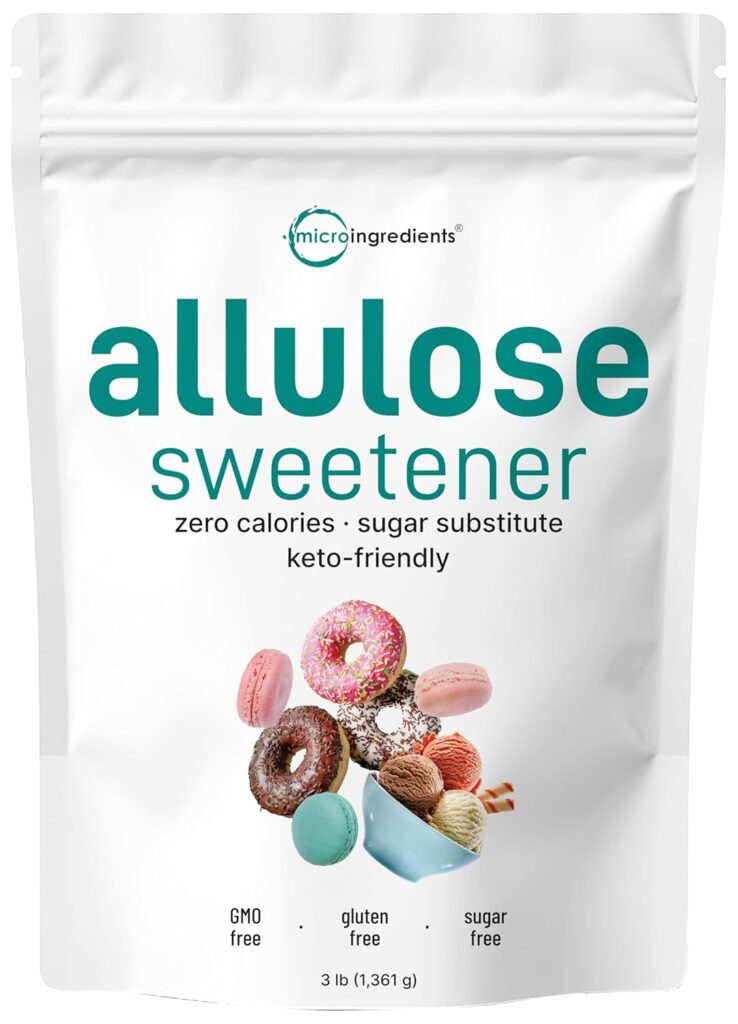
This rare sugar is almost calorie-free, with a taste and texture remarkably similar to sugar. Allulose doesn’t raise blood sugar levels, making it excellent for recipes like ice creams and syrups. It’s a game-changer in the keto world!
Allulose is a rare sugar that’s gaining popularity as a game-changing sweetener in the health and wellness world. Naturally found in small quantities in foods like figs, raisins, and jackfruit, allulose offers the taste and texture of sugar with only a fraction of the calories. It’s especially loved by those on low-carb, keto, and sugar-conscious diets for its impressive health benefits and versatility.
What Makes Allulose Unique?
Allulose stands out due to its distinctive qualities:
- Sugar-Like Taste and Texture: Unlike some sweeteners, allulose mimics the taste and mouthfeel of sugar almost perfectly.
- Low Calorie Content: Allulose has just 0.2–0.4 calories per gram—about 90% fewer calories than sugar.
- Minimal Blood Sugar Impact: It has a glycemic index of nearly zero, meaning it doesn’t spike blood sugar or insulin levels.
- Non-Crystallizing: Allulose remains smooth and doesn’t crystallize, making it ideal for syrups and frozen desserts.
- Digestibility: Most of allulose is absorbed but not metabolized, allowing it to be excreted without contributing to calorie intake or raising blood glucose.
Benefits of Allulose
Allulose offers a variety of health and practical benefits:
- Weight Management: Its ultra-low calorie content supports weight loss or maintenance by reducing overall calorie intake.
- Blood Sugar Control: With minimal impact on blood glucose, allulose is a great choice for diabetics and those managing insulin resistance.
- Heart Health: Some studies suggest that allulose may help reduce fat accumulation and support healthy cholesterol levels.
- Anti-Inflammatory Properties: Research indicates that allulose may have anti-inflammatory effects, further supporting its role in a healthy diet.
- Ideal for Keto and Low-Carb Diets: With nearly zero net carbs, allulose is a favorite among keto enthusiasts.
Popular Uses of Allulose
Allulose is a versatile sweetener with many culinary applications:
- Baking: Its sugar-like texture and behavior make it perfect for cookies, cakes, brownies, and other baked goods.
- Frozen Desserts: Allulose doesn’t crystallize, making it ideal for smooth ice creams and sorbets.
- Beverages: Sweeten coffee, tea, smoothies, or cocktails without adding carbs or calories.
- Syrups and Sauces: Use allulose to create sugar-free syrups, jams, or caramel sauces.
- Homemade Treats: From keto candies to sugar-free glazes, allulose fits seamlessly into many recipes.
Potential Drawbacks
While allulose has numerous benefits, it’s important to consider its limitations:
- Cost: Allulose is more expensive than many other sweeteners due to its production process and rarity in nature.
- Digestive Sensitivity: In some individuals, consuming large amounts of allulose can cause bloating, gas, or mild digestive discomfort.
- Limited Availability: While growing in popularity, allulose isn’t as widely available as other sweeteners like stevia or erythritol.
- Less Sweet than Sugar: Allulose is about 70% as sweet as sugar, so you may need to use slightly more in recipes.
Why Choose Allulose?
Allulose is an excellent choice for those seeking a natural, low-calorie sweetener that closely mimics sugar in both taste and texture. Its ability to support blood sugar control, contribute to weight management, and fit seamlessly into a wide range of recipes makes it a top contender for anyone avoiding sugar.
Pro Tips for Using Allulose
- Adjust for Sweetness: Since allulose is less sweet than sugar, you may need to use about 1.3 times the amount of sugar in recipes.
- Blend with Other Sweeteners: Combine allulose with stevia, monk fruit, or erythritol for enhanced sweetness and reduced cost.
- Perfect for Ice Cream: Use allulose to create soft, scoopable ice creams without the crystallization that occurs with other sweeteners.
- Monitor Portions: Start with smaller amounts if you’re sensitive to sugar alcohols or experience digestive discomfort.
- Experiment with Baking: Allulose browns similarly to sugar, so it works well in recipes that require caramelization or a golden crust.
Sweetener Blends: Are They Worth It?
Blends like stevia-erythritol combine taste, texture, and cost-effectiveness. These mixes work well in recipes, beverages, and store-bought keto products. Just check labels for hidden carbs or fillers. Experimenting with blends can expand your culinary possibilities!
Common Pitfalls When Choosing Keto Sweeteners
Hidden Carbs
Products labeled “sugar-free” may contain carb-laden ingredients like maltodextrin or dextrose. Always read labels carefully.
Digestive Issues
Sugar alcohols like erythritol and xylitol can cause bloating or gas. Start with small amounts to see how your body reacts.
How to Use Keto Sweeteners in Recipes
Here’s how to make the most of keto-friendly sweeteners:
- Substitution Ratios: Many sweeteners are sweeter than sugar, so check packaging for proper conversion.
- Baking: Erythritol and allulose work well in baked goods, offering a sugar-like texture.
- Beverages: Stevia and monk fruit dissolve effortlessly in liquids like coffee or smoothies.
- Creative Recipes: Try sugar-free jams with allulose or keto chocolate mousse sweetened with monk fruit. The possibilities are endless!
Conclusion
Staying keto doesn’t mean sacrificing sweetness! With options like stevia, monk fruit, erythritol, and allulose, you can enjoy low-carb desserts and drinks guilt-free. Experiment with these sweeteners to discover your favorites and craft delicious treats that keep you on track.
Ready to sweeten your keto journey? Start exploring these substitutes today and indulge without compromise!
Disclaimer
We are not medical professionals. This article is for informational purposes only. Consult a doctor or qualified healthcare provider before making significant dietary changes, especially if you have underlying health conditions.
This post contains affiliate links. If you click and make a purchase, I earn a commission at no additional cost to you. Every little bit helps. We appreciate your support.

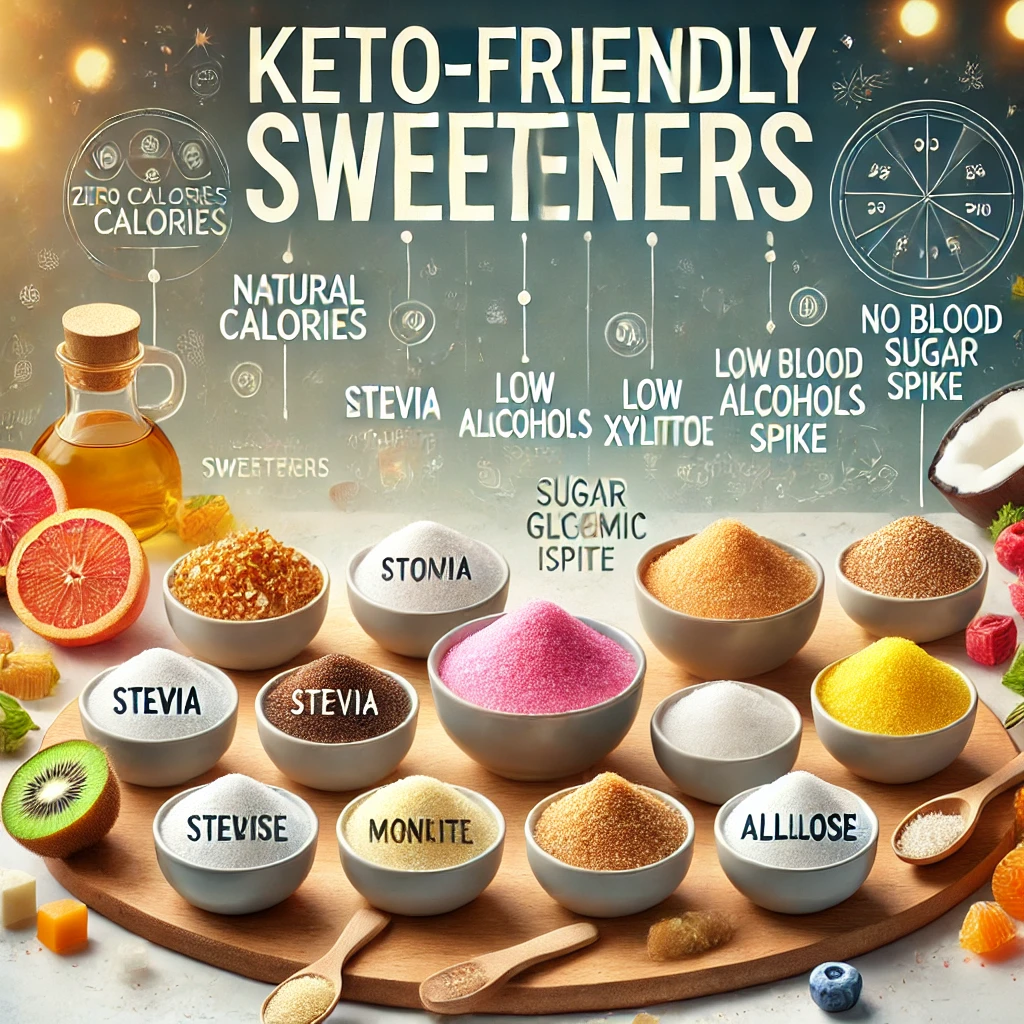
Leave a Reply